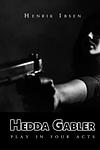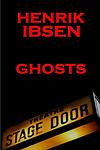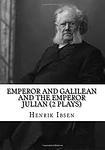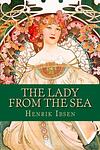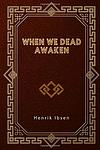Henrik Ibsen
Henrik Ibsen was a prominent Norwegian playwright and theatre director of the 19th century. He is often referred to as 'the father of realism' and is one of the founders of Modernism in theatre. His major works include 'A Doll's House', 'Ghosts', 'Hedda Gabler', and 'Peer Gynt'. Ibsen's plays were considered scandalous at the time for their critical stance on the morals and values of society, and they continue to be influential to this day.
Books
This list of books are ONLY the books that have been ranked on the lists that are aggregated on this site. This is not a comprehensive list of all books by this author.
-
1. A Doll's House
This classic play focuses on the life of Nora Helmer, a woman living in a seemingly perfect marriage with her husband, Torvald. However, as the story unfolds, it becomes clear that Nora has been hiding a significant secret related to their finances. The revelation of this secret, and the subsequent fallout, challenges societal norms and expectations of the time, particularly in regards to gender roles and the institution of marriage. Nora's eventual decision to leave her husband and children in pursuit of her own independence serves as a powerful commentary on individual freedom and self-discovery.
-
2. Hedda Gabler
"Hedda Gabler" is a dramatic play that centers on the life of its titular character, a woman trapped in a loveless marriage with a dull, reliable husband. She is bored with her life and longs for freedom and excitement. Her desire for control and power leads her to manipulate those around her, resulting in tragic consequences. The play explores themes of societal expectations, personal freedom, and the destructive power of boredom.
-
3. Selected Plays of Henrick Ibsen
This compilation includes a selection of plays by a renowned Norwegian playwright, who is often referred to as the father of realism. The collection showcases his talent for exploring complex human emotions, societal expectations, and moral dilemmas. The plays often feature strong female characters, a rarity for the time, and challenge the norms of the 19th-century society, making them timeless and relevant even today.
-
4. Peer Gynt
The play follows the adventures of its eponymous hero, a boastful and irresponsible Norwegian peasant who embarks on a series of fantastical and often selfish escapades. Throughout his life's journey, he encounters various mythical creatures, engages in business ventures, and pursues romantic interests, all while evading responsibility and the consequences of his actions. His quest for self-realization and identity takes him around the world, only to lead him back home to confront the reality of his wasted life and the love he scorned. The play is a poetic and satirical critique of the Romantic hero and delves into themes of existentialism, self-deception, and the nature of true self-fulfillment.
-
5. The Master Builder
"The Master Builder" is a play focused on the life of Halvard Solness, a successful yet self-absorbed architect who is haunted by past mistakes and fears the rise of a younger generation. His life takes a turn when a young woman, Hilda, arrives, reminding him of a promise he made to her a decade ago. As Solness grapples with his past, present, and future, the play explores themes of ambition, power, guilt, and the cost of success.
-
6. Brand
The play revolves around the story of a stern and idealistic priest who lives in the harsh, unforgiving climate of rural Norway. The protagonist is unwavering in his religious and moral convictions, refusing to compromise on his ideals even when faced with personal tragedy and the suffering of those around him. His rigid adherence to principle leads him to make decisions that have devastating effects on his own life and the lives of the community members. The narrative explores themes of sacrifice, the conflict between duty and compassion, and the quest for true Christian living in a flawed world. Ultimately, the protagonist's journey is a tragic reflection on the cost of absolute integrity.
-
7. An Enemy of the People
An Enemy of the People is a drama about a doctor in a small Norwegian town who discovers that the local baths, a source of pride and income for the community, are contaminated and dangerous to public health. Despite the potential harm to the town's residents, the doctor's warnings are ignored by the town's authorities and citizens due to the potential economic fallout. The doctor is ostracized and declared an 'enemy of the people,' leading to a critique of the democratic process and the responsibilities of individuals to their community.
-
8. The Wild Duck
"The Wild Duck" is a tragicomedy that explores themes of reality and illusion, as well as the destructive power of idealism. The story revolves around a man who returns home after 16 years to find his father married to his former lover. He believes he is doing the right thing by revealing the truth about their past, but his idealistic pursuit of the truth only leads to the destruction of the family's harmony. The wild duck in the story symbolizes the damage caused by harsh reality, suggesting that sometimes illusion is necessary for survival.
-
9. Emperor And Galilean
"Emperor and Galilean" is a historical drama that centers on the life of the Roman Emperor Julian the Apostate, who reigned in the 4th century. The play explores Julian's internal conflict as he attempts to revive pagan worship in the face of the growing influence of Christianity. As Julian becomes increasingly disillusioned with Christian doctrine, he seeks to establish a new world order based on a synthesis of Greek philosophy and pagan gods. His quest for spiritual and political transformation leads him on a tragic journey, culminating in his ultimate failure and realization of the futility of his ambitions. The narrative delves into themes of power, faith, and the human struggle between the divine and earthly realms.
-
10. The Lady From The Sea
The play centers around Ellida Wangel, a lighthouse-keeper's daughter who is trapped in an unhappy marriage with Dr. Wangel. She is haunted by her past and her mysterious attachment to a seafaring stranger who once promised to return for her. As she grapples with her longing for the sea and her duty to her family, the play explores themes of freedom, choice, and the powerful pull of one's origins. When the stranger reappears, Ellida must confront her desires and decide whether to remain on land with her husband and stepdaughters or to yield to the call of the sea and the life she once knew.
-
11. When We Dead Awaken
"When We Dead Awaken" is a dramatic play that revolves around the story of a renowned sculptor who encounters his muse from the past, leading to a profound reevaluation of his life and work. As he grapples with the realization that his artistic success has come at the expense of genuine human connection and passion, the play delves into themes of artistic integrity, lost love, and the quest for redemption. The narrative unfolds in a series of intense encounters and conversations, culminating in a climactic moment that forces the characters to confront the consequences of their choices and the transient nature of life and art.

